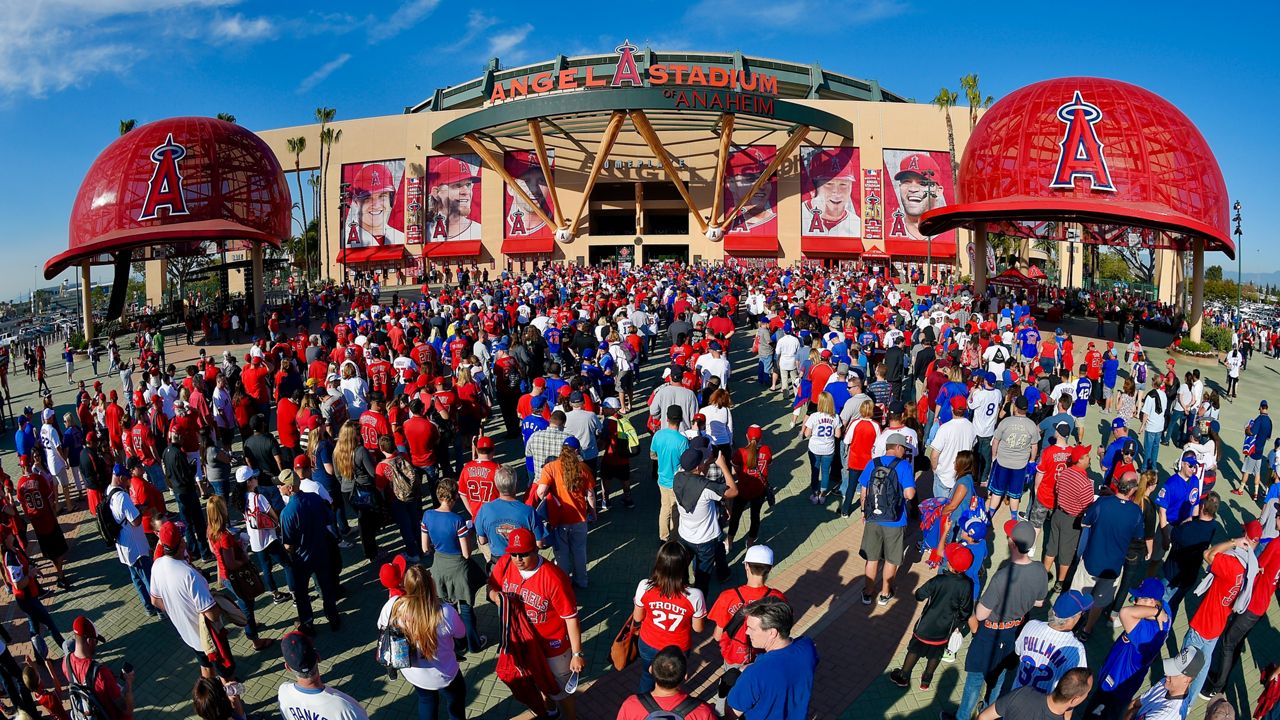ANAHEIM, Calif. — The city and the public will soon finally be able to know the exact condition of Angel Stadium.
After years of bickering between the city and Los Angeles Angels owner Arte Moreno regarding the maintenance and disrepair of Angel Stadium, the Anaheim City Council Tuesday voted to evaluate the condition of the aging stadium, the fourth oldest in Major League Baseball.
In the next few months, city staff will send a proposal request to find a company to conduct a complete property condition and structural assessment of the stadium, built-in 1966. The goal, a city spokesman said, is to have it ready in the second half of next year.
"It's important for the people of Anaheim and the council to know the condition of the stadium and [whether it is] being kept at a first-class professional baseball stadium," said Councilman Jose Moreno, no relation to Angel's owner Arte Moreno. "So that the current tenant or any potential tenant, we have an assessment from which we can work [from] on that lease obligation."
The council's decision comes as Arte Moreno is exploring selling the baseball franchise after another disappointing season on the field and mired in controversy outside of it relating to the stadium.
The stadium, its aging condition, and whose responsible for maintaining it have long been a point of contention between the city and Angels owner Arte Moreno.
Arte Moreno, who purchased the team in 2003, claimed the stadium over the years needed more than $150 million for essential maintenance and repairs.
Under the 1996 stadium lease agreement, the Angels are responsible for the upkeep of the city-own stadium and maintaining it as a first-class major league ballpark.
Anaheim spokesman Mike Lyster said the city, since 2002, has contributed $12.3 million to the Angels for their share of capital improvements and repairs. He said that the Angels have put in about $42 million since 2002.
"Under current ownership, we have spent approximately seven times more than what the lease requires in capital improvements and maintenance," an Angels spokeswoman said in a statement to Spectrum News.
The city and the Angels have tried to strike various deals to keep the team in Anaheim long-term and the stadium in tip-top shape, including leasing the stadium to the Angels for $1 a year and Arte Moreno building commercial real estate outside of it.
Nothing materialized.
The negotiations were always a start-stop process, the Angels spokesperson said.
In recent developments, Arte Moreno's real estate development firm, SRB Management, thought they had completed the sale for the city-owned 150-acre stadium and surrounding parking lots with the city earlier this year.
However, that deal died soon after the FBI began a corruption investigation on the city's lead stadium negotiator and now former mayor Harry Sidhu.
The FBI claims Sidhu shared confidential information with someone from the Angels organization during negotiations as part of an effort to secure a $1 million campaign contribution for his reelection campaign.
Sidhu, who denied any wrongdoing, resigned in May. The FBI did not implicate the Angels.
The city, in 2019, behind the backing of Sidhu, then struck a controversial lease extension for the Angels to remain in Anaheim until 2038.
In August, Arte Moreno, who purchased the team for $180 million, announced that he was exploring the team's sale for a reported $2.5 billion.
With the stadium deal dead and Arte Moreno looking to sell the team, the council is looking for a fresh start with the appraisal of the stadium for themselves or potentially a new owner.
Lyster, the city spokesman, said that inflation and the high construction cost mean the reported $150 million to repair the stadium is probably double these days.
Ultimately, the council and potentially a new owner will need to decide whether it is more cost-effective to shell out hundreds of millions of dollars to renovate the stadium or start over and build a new one, ground-up.
"One of the driving reasons why we are doing is that we could see new ownership of the team," said Lyster. "It's a good time to do an assessment, and if we see a new owner, it's a fresh start to see the long-term issues of the stadium and how we can resolve them."



